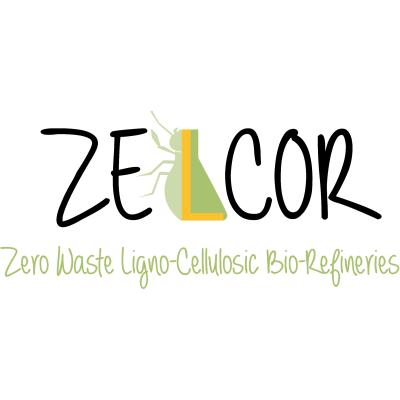
Zelcor
Zero Waste Ligno-Cellulosic Biorefineries by Integrated Lignin Valorisation

Zero Waste Ligno-Cellulosic Biorefineries by Integrated Lignin Valorisation
Lignocellulosic feedstocks (dry matter plant biomass) are commonly used in the production of biofuels and bio-based chemicals. However, a major disadvantage of these feedstocks is the presence of substantial amounts of lignin, an aromatic polymer that is difficult to break down. This so called "recalcitrance" means lignocellulosic feedstock is often considered primarily as a waste product, utilised to produce energy through burning.
The Zelcor project intends to demonstrate the feasibility of transforming lignocellulose recalcitrant side streams (lignocellulosic residues from ethanol production, lignins dissolved during pulping and lignin-like humins formed by sugars conversion) into high added-value bio-based products, including fine chemicals. This will be achieved by combining chemical and enzymatic catalysis with insect-based bioconversion.
Demonstrating of the project's feasibility will be performed by process scaling-up, formulation of end-product prototypes and value chain sustainability and safety assessment.
Zelcor aims at demonstrating the feasibility of transforming recalcitrant by-products considered as waste, namely lignin- and humins-rich streams, into high added value biobased products, including fine chemicals.
The specific driving idea is to combine chemical and enzymatic catalyses with microbial bioconversion to develop an integrated flexible biorefinery system for the conversion of these heterogeneous and variable by-products.
Destructive insects produce high-value products from organic waste
10 November 2021
BBI JU-funded researchers and industry are putting insects to work – from termites that destroy wooden buildings to insect larvae that are outstanding natural waste converters. Packaging, cosmetics, pharmaceuticals and animal feed are just some of the products they are beetling away to make for us. Read more
The BBI JU-funded Zelcor project created bio-based products from lignocellulose side streams
26 August 2021
EU-funded researchers have developed new value chains for creating novel sustainable products from bio-based waste. These will make the bio-based industry more economically viable and facilitate the transition away from a fossil fuel-based society. Read more
High added value bio-based products from lignocellulosic biorefinery wastes
01 June 2018
Find an article on our project Zelcor which is exploiting the potential of termites to demonstrate the feasibility of transforming by-products considered as waste into high-added value materials. Read more